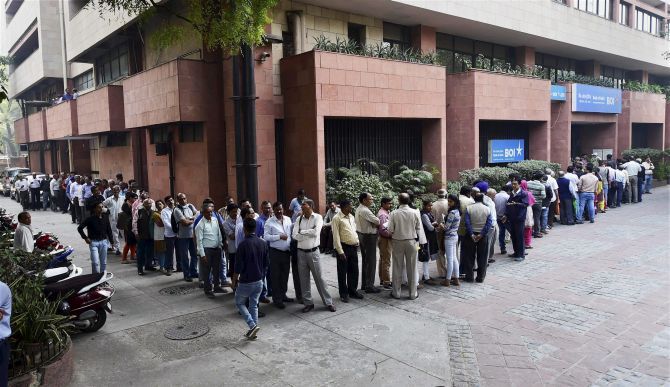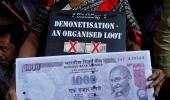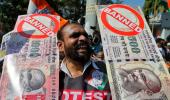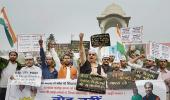The Supreme Court on Tuesday said limited scope of a judicial review in economic policy matters does not mean that the court will fold its hands and sit back, observing that the manner in which a decision is taken by the government can always be examined.

The top court was hearing a batch of 58 petitions challenging the demonetisation exercise announced by the Centre on November 8, 2016.
During the hearing, the Reserve Bank of India (RBI) submitted that "temporary hardships" were there and that they are also an integral part of the nation-building process but there was a mechanism by which problems that arose were solved.
A five-judge Constitution bench headed by Justice S A Nazeer said legal compliance of an economic policy can be examined by a constitutional court.
"Court will not go into the merits of the decision taken by the government. But it can always go into the manner the decision was taken. But, just because it is an economic policy, does not mean court will fold its hands and sit back.
"With regard to merits of the decision, it is for the government to know, in its wisdom, what is best for the people. But what was taken on record, whether all procedures were followed, we can look into," the bench, also comprising Justices B R Gavai, A S Bopanna, V Ramasubramanian, and B V Nagarathna, said.
The observations came after senior advocate Jaideep Gupta, appearing for the RBI, defended the demonetisation exercise and said there was no procedural lapse in the decision making.
"Judicial review cannot be countenanced in economic policy measure unless found to be unconstitutional. Economically relevant factors in economic policy making are best left to experts," Gupta submitted.
Rebutting the submission of the petitioners that citizens had to face severe hardships during demonetisation, the RBI counsel said elaborate measures were put in place to remonetise the economy.
"If the government is in such readiness to deal with the decision, then to call it thoughtless is not correct. It has also been stated that whenever a problem arose, government took cognisance.
"Temporary hardships were there. Temporary hardships are also an integral part of the nation-building process. Some of the hardships may not have been anticipated. But we had a mechanism by which problems that arose were solved," Gupta said.
During the hearing, the top court also sought details regarding the quorum in the RBI's central board meeting that recommended demonetisation.
"How many members were present? There should be no difficulty in telling us,” Justice BR Gavai asked.
Gupta replied, "We had the quorum, we have categorically taken that stand."
Appearing for one of the petitioners, senior advocate P Chidambaram said the RBI should make public the agenda note and the minutes of the meeting of the board of directors of RBI held on November 8, 2016.
"Why are they holding the minutes back? These documents are absolutely necessary to decide the issue. We must know what material they had, what consideration they did. We are not on the decision but with the process of decision-making," Chidambaram said.
The RBI needs to show they had considered the enormity and proportionality of their decision, he added.
"My lordships may see if the decision-making grounds were arbitrary or not and eschewed relevant considerations. Word monetary policy cannot stop this court from looking into these things. Cannot be frightened citing experts took a call."
The hearing remained inconclusive and will continue on Wednesday.
The Centre recently told the top court in an affidavit that the demonetisation exercise was a "well-considered" decision and part of a larger strategy to combat the menace of fake money, terror financing, black money and tax evasion.
Defending the exercise, the Centre had told the apex court that the step was taken after extensive consultations with the RBI and that advance preparations were made before the note ban was enforced.










